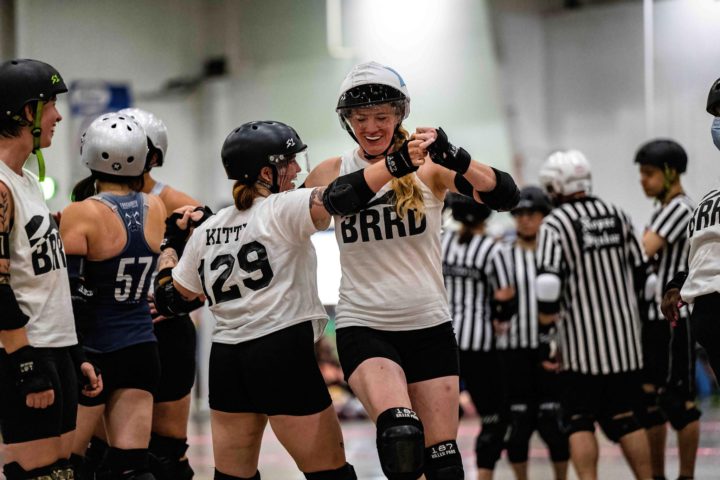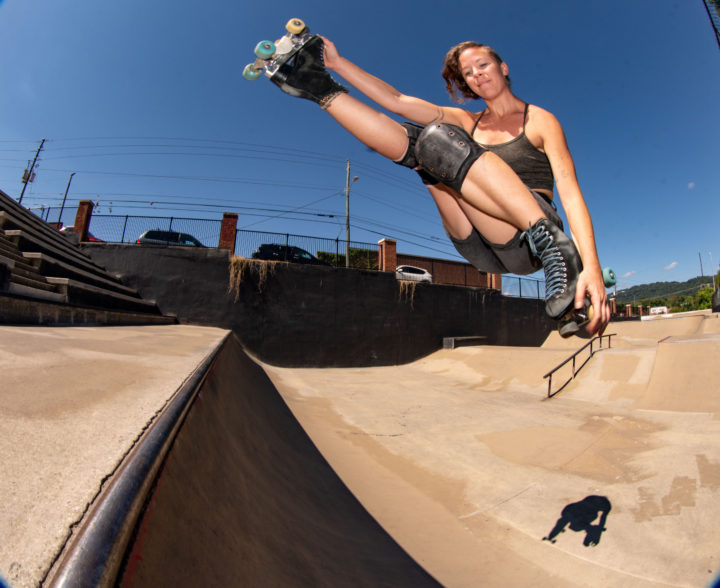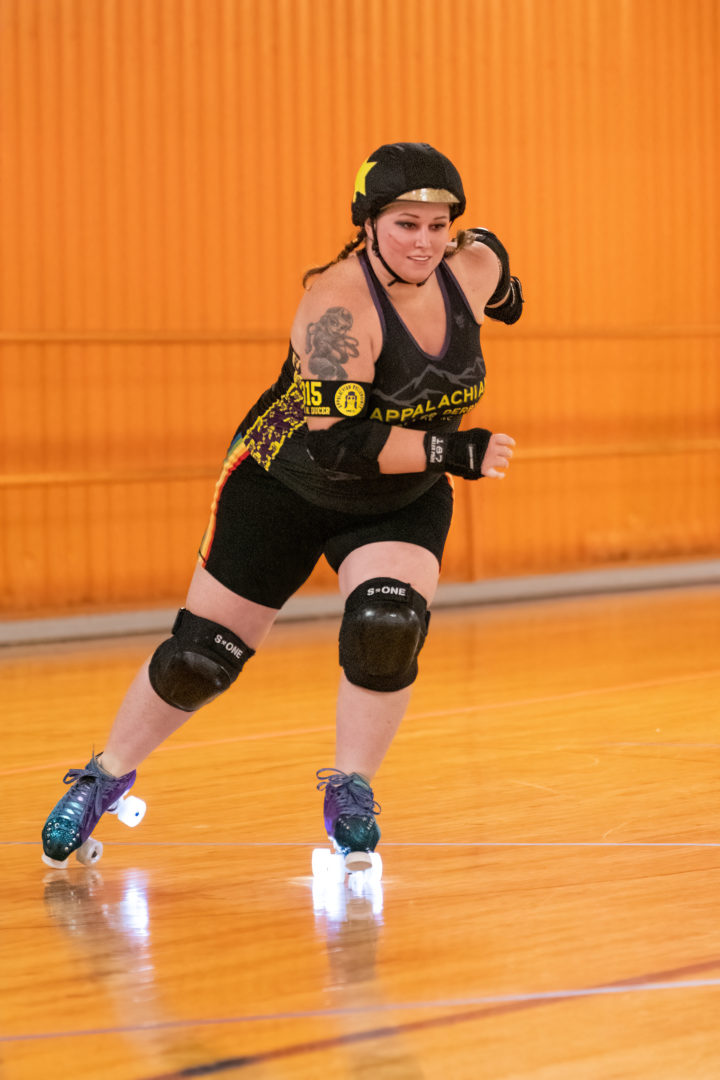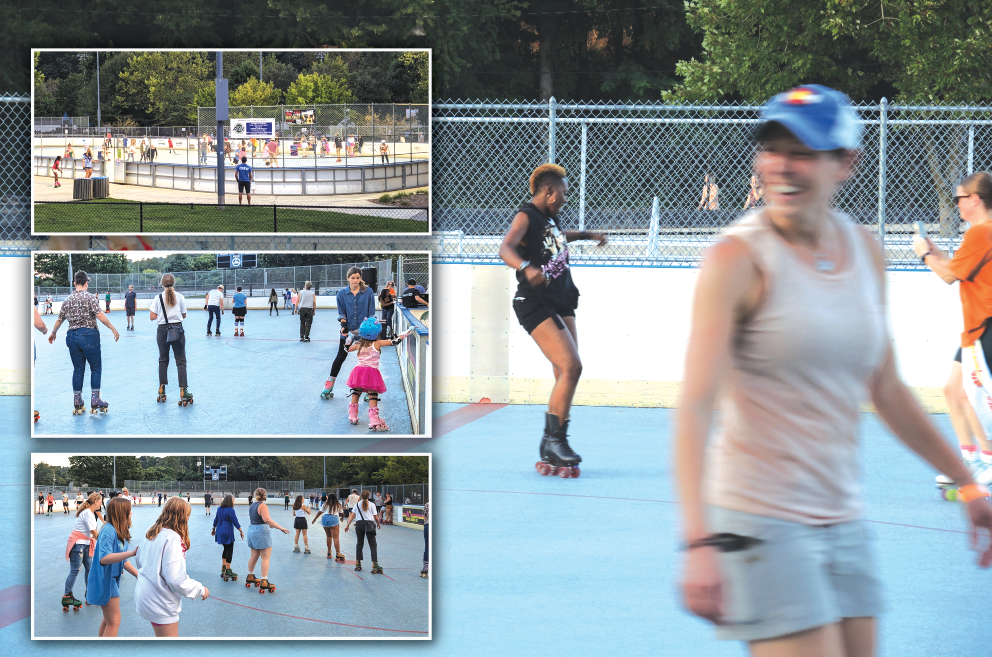It’s the last Saturday in August and one of the hottest nights of the year, but the rink at Carrier Park is filled with skaters. Adults and children wear Rollerblades or quads. Some skate in wide circles around the edges. Others try out new dance moves in small groups. Meanwhile, a few intrepid attendees cling to the walls, taking one shaky step at a time.
The group, hosted by AVLsk8, meets most Saturdays from 6-9 p.m., weather permitting. Though it’s just one of many roller-skating meet-ups in Western North Carolina, the group’s name came up multiple times in the course of reporting on this story. For many, AVLsk8 is the central hub for information about the area’s skating scene.
Co-founders Pattiy Torno and Ashanti Ternoir both say their goal is to bring people together and keep the skate community growing.
“Part of our mission, our desire, is to really expose people to each other,” says Ternoir. “And then to create a space that’s fun, that’s enjoyable through movement and skating and also through music.”
As I made my way around town, speaking with various members from numerous skating groups, it became evident that many, if not most, within the community echo Ternoir’s quest for connection.
Beyond the rink
AVLsk8 got its unofficial start in April 2022 when Ternoir and a few friends were skating in the CURVE Studios lot in the River Arts District. Torno, who owns the building, came outside.
“I was like, ‘Aw crap, she’s gonna kick us off,’” recalls Ternoir.
Instead, Torno grabbed a pair of skates that had been sitting in her closet (“mostly unused” since 1980, she admits) and joined them.
The group soon began meeting regularly on Sundays for what they called “skate church”— two hours of curated playlists, refreshments and roller-skating. Eventually, they set eyes on a more public and accessible space. After working with Asheville Parks and Recreation, the group received a contract to lead 35 Saturday skate nights at Carrier Park throughout 2023.
These events feature a “resident DJ”— DJ Venn — who plays a mix of hip-hop, funk, reggae and disco. On the night I attended, highlights included The Jacksons’ “Shake Your Body (Down to the Ground),” Archie Bell & The Drells’ “Let’s Groove” and Rose Royce’s “Car Wash.” The music’s influence was unmistakable: feet moved in unison, keeping time with the beat.
Since its launch, members of AVLsk8 have shown up for each other outside of the rink — at birthdays, weddings and parties. And more recently, they assisted Torno as she recovered from hip surgery. Beyond their inner circle, the group has also helped recondition skates that the city purchased from an old rink. These skates are now available for loan at Asheville Parks and Recreation’s Friday night skate groups, which happen once a month at Carrier Park.
Built-in family
Similarly, Blue Ridge Roller Derby, which launched in 2006, continues to attract new teammates, not only because of its members’ love of skating but also for the group’s built-in community.
Carla Hung (aka Street Flasher), who moved to Asheville from New York during the pandemic, says she lived here for two years without a “robust sense of friendship.” But all of that changed when she joined Blue Ridge Roller Derby in 2022. Despite having never skated before (“I was on my ass the entire first season,” she admits), Hung felt “extremely welcomed” by the team. Now, she says, she not only has a group of 20-30 people “immediately there” for her locally, but she’s found connection with other derby groups while traveling.
Hung and her teammates Bonnie Richardson (aka Fear, Kitty Kitty), Marissa Sherman Deziel (aka Margaret Snatch’Her) and Kelsey Kilgore (aka Slay Love) rattle off ways they’ve been there for each other outside of the arena — providing meal trains for new mothers, offering grief support, hosting fundraisers, acting as pet sitters and meeting up to workout, hike, run and skate outside of practice.

Under the shelter of the Smoky Mountain Event Center in Waynesville, I watch the team gear up and transform into fierce, competitive adversaries as they prepare to face off for an evening’s practice. When the whistle blows, the group morphs into a crunch of equipment as the two “jammers” try to pass the “blockers” to score points. Elbows and arms extend, knees bend and feet go wide.
“You become a superhero version of yourself when you come to roller derby,” says Deziel smiling.
While it might appear the players are relying on brute force and muscle to score points, Hung says, “It requires an inordinate amount of skill and strategy.” She adds that “every body type has a role and something they’re good at.”
“You don’t feel alone at any point. You’re part of a puzzle,” explains Richardson. “[In roller derby] I can lean on other people’s skills. I don’t need to be everything.”
Face your fears
Fear of a roller derby collision leads me to slowly back out of the event center and toward the relative safety of my car. Ironically, I later learn that fear is the very thing that drives some skaters to the sport.
Carolyn Lewis, like many interviewed for this article, started skating during the pandemic when it was safer to socialize exclusively outdoors. On her 27th birthday, she bought herself a pair of skates and in December 2020 started hosting meet-ups at Carrier Park and other places around town.

Soon, she wanted to try skate park skating at places such as the Asheville Skatepark (known as the Food Lion by local users) and The Foundation. At both venues, concrete forms bowls, ramps, banks and built-in stairs that offer opportunities to practice tricks and more advanced moves. Lewis says she felt nervous and intimidated because she was a woman on quad skates at parks dominated by men and boys on skateboards. Historically, she notes, the two types of riders have not gotten along in shared spaces, though she adds dynamics are improving.
Going with a group of fellow skaters, she says, helped her feel more comfortable and confident. She kept with it, and after the sudden death of a close family member, skate park skating became her lifeline, helping her to heal in community and process difficult emotions.
“I was grieving, and it was hard to be present,” recalls Lewis. “So, when I would go to the skate park, I would stand up on top of the ramp — sometimes … for like five minutes — just feeling my fear. Just standing there breathing and feeling that feeling was healing in itself.
“I don’t stand up on top of a ramp breathing for five minutes anymore,” Lewis continues. “But it’s my emotional management. It’s like my therapy. … The fear and all the intensity of it grabs you and brings you right to the present moment.”
Parallel play
For skaters not yet ready to slam into opponents or whiz over concrete slabs, less intimidating groups exist around Asheville. Skater Chelsea Farley organizes River Skate Revival — a group that rides 3.2 miles along the relatively flat Wilma Dykeman Greenway in the River Arts District every Sunday at 6 p.m. Though the group doesn’t require fancy footwork or gravity-defying tricks, Farley recommends the course for “advanced beginners”— skaters who are comfortable skating forward, lifting one foot at a time off the ground and stopping (whether using toe, T or plough stop methods).
Barring an understanding of skate basics, Farley says the group aims to be inclusive, allowing strollers, scooters and skateboarders alongside roller skaters and Rollerbladers.
“I found, personally, skating is one of the most diverse groups of people in all of Asheville,” says Farley. “I’ve seen every race out there. I’ve seen every gender out there. I’ve seen every economic status out there. You’ve got lots of different types of neurodivergent people out there, and when all those people come together around something joyous, it’s a really good community builder.”
Farley, who identifies as neurodivergent, says trail skating offers a safe group activity for people who struggle with social anxiety and making eye contact. These meet-ups, she adds, permit “parallel play” where members can skate side by side and don’t need to engage others face to face. She says it offers connection, community, physical exercise and mental health support.
Advice for beginners

Asheville skater Jenna Lynn Davis built community through social media. Davis has 160,000 followers on Instagram and 408,000 followers on TikTok (@jennalynn.rollersk8s on both platforms). Last year, she posted videos of herself trying new skate moves every day for 365 days. Though she also skates with Appalachian Roller Derby and joins meet-ups at Carrier Park and around town when time allows, Davis found she was best able to learn and grow by watching videos online. The accountability of her thousands of followers also kept her committed to the yearlong challenge.
“I definitely grew as a skater in general,” Davis says. “Just being in skates all the time made me more comfortable. … It becomes almost more like walking or running when you’re in skates that much.”
Regardless of whether new riders join a group, take classes or practice at home with the help of videos, Davis recommends wearing safety gear, especially knee pads, to prevent injury. And while social media can be helpful for bringing people together, she cautions to keep perspective, too. “The biggest piece of advice I always tell people is not to compare yourself to others and always compare your progress to what you did before,” says Davis.
Ken Bradenburg, who skates with an adult group at Smoky Mountain Sk8way & Fun Zone in Waynesville on Thursday nights from 7-10 p.m., echoes Davis’ encouraging words.
Despite being “really terrible” and “falling down a lot” his first time on skates as a kid, he kept going back and has stayed with it through the years, having skated at 55 different rinks across the country to date. His advice to beginners: “The common perception is that, ‘Oh, if I go skating and I fall down, people are gonna laugh.’ It’s really the exact opposite. Everyone that I know that puts serious time into roller-skating recognizes it’s a journey. It’s not something that you just readily pick up and do.”
Sweater weather
The outdoor groups I spoke to all say they plan to continue skating through the winter, adjusting their start times for when the sun is up and the early morning frost has melted. Many also expressed hope that Asheville would someday have a more accessible, covered rink for shared use.
“It’s like this roller renaissance going on and that makes me very happy,” says Farley.
Keeping the momentum going, Farley and other skaters stress, is important. The communities they’re building, they say, are some of the city’s most eclectic.
“I’ve lived in Asheville for 40 years, and this is the most diverse space that I get to inhabit … where gender and race and age are just nonissues,” says Torno of AVLsk8. “Everybody’s smiling and having a good time.”
“It’s about showing up for community,” adds Ternoir of AVLsk8. “It’s about being there, creating this place for people just to be. It doesn’t matter who you are, or where you come from or how you identify, we want all those people there.”




Before you comment
The comments section is here to provide a platform for civil dialogue on the issues we face together as a local community. Xpress is committed to offering this platform for all voices, but when the tone of the discussion gets nasty or strays off topic, we believe many people choose not to participate. Xpress editors are determined to moderate comments to ensure a constructive interchange is maintained. All comments judged not to be in keeping with the spirit of civil discourse will be removed and repeat violators will be banned. See here for our terms of service. Thank you for being part of this effort to promote respectful discussion.